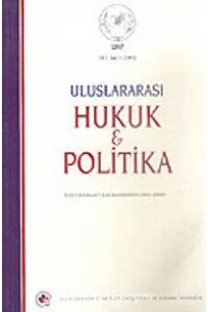Intervention Brigade' for the Congo: A Precedent for UN Peace Enforcement?
Kongo Demokratik Cumhuriyeti, 1996 yılında başlayan iç silahlı çatış- malardan dolayı ciddi manada zarar görmüştür. Söz konusu çatışmalar sebebiyle Kongo fakirleşmiş ve bir milyonun üzerinde insan yerinden edilmiş, pek çok savunmasız köy silahlı çatışmalara maruz kalmış, kadınlar ve çocuklar kaçırılmış, çocuklar zorla çalıştırılmış ya da çatışmalara katılmış, kadınlar da tecavüze maruz kalmış ve seks işçisi olarak çalıştırılmıştır. Söz konusu çatışmalara Birleşmiş Milletler mü- dahale etmiştir. Birleşmiş Milletlerin işbu müdahalesi, barışı kurma, sağlama, sivilleri ve meşru hükümeti koruma amacı gütmektedir. Söz konusu müdahale, bazı açılardan olumlu sonuçlar vermiştir. Ancak son zamanlarda gerçekleşen çatışmalar, Doğu Afrikanın barış ve istikrarını olumsuz etkilemiştir. İlgili sorunu çözmek amacıyla, Birleşmiş Milletlerin Kongo Misyonu (MONUC) yeniden yapılandırılmış, Nisan 2013 tarihinde BM Kongo Özel Misyonu (MONUSCO)na dönüştürülmüştür. Söz konusu özel misyonda, Müdahale Birliği kurularak, uzun süren bu yarım yüzyıllık çatışmaları sona erdirmek için görev ve yetkileri genişletilmiştir. Makalede, Birleşmiş Milletlerin barışı kurma, sağ- lama, yürütmeye yönelik bu girişimini, hâlihazırda kaydedilen ilerleme ve gelecekte Kongoda barışı sağlama ihtimali değerlendirilecektir. Nihayetinde Müdahale Birliğinin, Birleşmiş Milletlerin bundan sonraki barış gücü operasyonları bakımından bir emsal teşkil edip etmeyeceği sorusu tartışılacaktır.
Kongoya Müdahele Birliği: BM Barışı Uygulama İçin Bir Emsal Mi?
The Democratic Republic of Congo has been devastated by internal armed conflict which has continued since 1996 till date. This conflict has further impoverished the nation resulting in internal displacement of over a million people, prevalent incidences of armed attacks on defenseless villages and people, abduction of women and children, conscription of children into paramilitary armies, forced labor, widespread epidemics and diseases, loss of lives, systematic rape, and sex slavery. The UN intervened in the form of peace-keeping, peace-making, protection of civilians, and the legitimate government of the country. Recently, the conflict has taken a new worrisome dimension which threatens the peace and stability of the whole Eastern Africa region. In April, 2013 the UN Security Council established an Intervention Brigade, the first of its kind, for Congo within the MONUSCO system with a clear mandate to take certain offensive operations with the aim of neutralizing and disarming the rebels involved in the conflict with an aim to ending the half-a-century-long conflict. While appraising the recent initiatives at peace maintenance, peace building, peace keeping, peace enforcement regarding the crisis, and the prospects for peace in the future for Congo, the article presents an analysis as to whether the establishment of the Intervention Brigade will be a precedent or not.
___
Botrous-Ghali, Botrous, Empowering the UN, Foreign Affairs, Winter 1992-1993.Boulden, Jane, Peace Enforcement: The United Nations Experience in Congo, Somalia, and Bosnia, (Greenwood Publishing Group, 2001).
Carter Center, Final Report on the Presidential and Legislative Elections in the Democratic Republic of the Congo, 28 November 2011.
de Heredia, Marta Iniguez, The Space for Congolese Self-Determination Between Absences and Presence of the African Union and the United Nations, AJPSIR, Vol. 3, No. 1, 2009, pp. 1-14.
Essuman-Johnson, A., Regional Conflict IResolution Mechanisms: A Comparative Analysis of Two African Security Complexes, AJPSIR, Vol. 3, No. 10, 2009, p. 409- 422.
Frye, William R., ed., A United Nations Peace Force (New York: Oceana Publications, 1957).
Geneva Conventions of 12th August, 1949 and the Additional Protocols, http://www. icrc.org/eng/war-and-law/treaties-customary-law/geneva-conventions/.
Janik, Ralph R. A., Putting Security Council Resolution 2098 on the Democratic Republic of Congo in Context: The Long Way of Peacekeeping, Human Security Perspectives, Vol. 10, 2014, p. 142-185.
Jourdan, Luca, Mayi Mayi: Young Rebels in Kivu, DRC, Africa Development, Vol. 36, No. 3&4, 2011, p. 89-111.
Malachy, Chukwuemeka E., Exogenic Factor and the Futility of Conflict Resolution in Africa: The Darfur Experience, AJPSIR, Vol. 6, No. 2, 2012, p. 35-36.
Miller, Andrew S., Universal Soldiers: UN Standing Armies and the Legal Alternatives, Georgetown Law Journal, No. 81, 1993, p. 773-828.
Nicholson, Graham, An Essay on the Necessity for Universal Outlawing of Use of Force in the 21st Century IJPDS, Vol. 4, No. 6, 2013, p. 100-115.
Okonko et al., Conflict and the Spread of Emerging Infectious Diseases: Where do we Go from Here? AJMR, Vol. 3, No. 13, 2009, p. 1015-1059.
Onyango, George K., The Place of Spoilers in Peace Process in Sudan, AJPSIR, Vol. 6, No. 8, 2012, p. 169-170.
Ramacandra, Pradhana, The United Nations and the Congo Crisis, (New Delhi: MANAS Publications, 1975).
Report of the Secretary-General on Conflict-Related Sexual Violence, 13th January 2012, A/66/657-S/2012/33.
Report of the Secretary-General on Conflict-Related Sexual Related Sexual Violence, 14th March, 2013, A/67/792-S/2013/149.
Rikhye, Indak Jit, The Theory and Practice of Peacekeeping (London: C. Hurst &Co., 1984).
Shekhawat, Seema, Governance Crisis and Conflict in the Democratic Republic of Congo, University of Mumbai, Working Paper No. 6, 2009, p. 7-17.
Special Report of the United Nations Secretary-General on the Democratic Republic of the Congo and the Great Lakes Region to the Security Council, 27th February, 2013 United Nations, http://www.un.org/en/peacekeeping/missions/monusco/background. Shtml.
Williams, Christopher, Explaining the Great War in Africa: How Conflict in the Congo Became a Continental Crisis, The Fletcher Forum of World Affairs, Vol. 37, No. 2, Summer, 2013, pp. 81-100.
United Nations Charter, 1945, Articles 39-51.
United Nations Security Council Resolution 1234 of 9 April, 1999.
United Nations Security Council Resolution 1279 of 30 November,1999.
United Nations Security Council Resolution 1925 of 28 May, 2010.
United Nations Security Council Resolution 2053 of 27 June, 2012.
United Nations Security Council Resolution 2098 of 28 March, 2013.
United Nations Security Council Resolution 2147 of 28 March, 2014.
USAID Fact Sheet No. 2, 2014.
Yilmaz, Muzaffer E., Successful Interventions in Internal Conflicts: A Framework, JLCR, Vol. 3, No. 1, 2011.
- ISSN: 1305-5208
- Yayın Aralığı: Yılda 5 Sayı
- Başlangıç: 2018
- Yayıncı: Uluslararası Stratejik Araştırmalar Kurumu
Sayıdaki Diğer Makaleler
Intervention Brigade' for the Congo: A Precedent for UN Peace Enforcement?
Limits of EU Democracy Promotion in the Arab Middle East: The Cases of Egypt and Morocco İrem
Avrupa Birliği'nin Arap-İsrail Uyuşmazlığı'ndaki Üçüncü Taraf Rolünün Değerlendirilmesi
Intervention Brigade' for the Congo: A Precedent for UN Peace Enforcement?
Avrupa Birliği'nin Arap-İsrail Uyuşmazlığı'ndaki Üçüncü Taraf Rolünün Değerlendirilmesi
